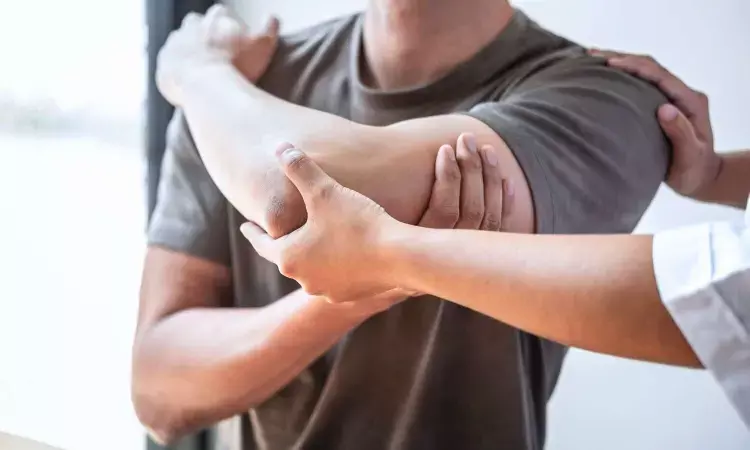- Home
- Medical news & Guidelines
- Anesthesiology
- Cardiology and CTVS
- Critical Care
- Dentistry
- Dermatology
- Diabetes and Endocrinology
- ENT
- Gastroenterology
- Medicine
- Nephrology
- Neurology
- Obstretics-Gynaecology
- Oncology
- Ophthalmology
- Orthopaedics
- Pediatrics-Neonatology
- Psychiatry
- Pulmonology
- Radiology
- Surgery
- Urology
- Laboratory Medicine
- Diet
- Nursing
- Paramedical
- Physiotherapy
- Health news
- Fact Check
- Bone Health Fact Check
- Brain Health Fact Check
- Cancer Related Fact Check
- Child Care Fact Check
- Dental and oral health fact check
- Diabetes and metabolic health fact check
- Diet and Nutrition Fact Check
- Eye and ENT Care Fact Check
- Fitness fact check
- Gut health fact check
- Heart health fact check
- Kidney health fact check
- Medical education fact check
- Men's health fact check
- Respiratory fact check
- Skin and hair care fact check
- Vaccine and Immunization fact check
- Women's health fact check
- AYUSH
- State News
- Andaman and Nicobar Islands
- Andhra Pradesh
- Arunachal Pradesh
- Assam
- Bihar
- Chandigarh
- Chattisgarh
- Dadra and Nagar Haveli
- Daman and Diu
- Delhi
- Goa
- Gujarat
- Haryana
- Himachal Pradesh
- Jammu & Kashmir
- Jharkhand
- Karnataka
- Kerala
- Ladakh
- Lakshadweep
- Madhya Pradesh
- Maharashtra
- Manipur
- Meghalaya
- Mizoram
- Nagaland
- Odisha
- Puducherry
- Punjab
- Rajasthan
- Sikkim
- Tamil Nadu
- Telangana
- Tripura
- Uttar Pradesh
- Uttrakhand
- West Bengal
- Medical Education
- Industry
Denosumab and zoledronic acid therapy improves BMD in periprosthetic bone

A new study by Xiao Li and team showed that denosumab and zoledronic acid (ZA) are effective treatments against decline in periprosthetic bone mineral density. The findings of this study were published in Archives of Osteoporosis.
Following a total hip arthroplasty (THA), periprosthetic bone mineral density (BMD) loss may endanger the longevity of implants. By suppressing osteoclast activity, zoledronic acid and denosumab were successful in lowering bone loss in diseases linked to rapid bone turnover. In order to evaluate the effectiveness and safety of ZA and denosumab for periprosthetic BMD loss following THA, a meta-analysis was conducted.
MEDLINE, Embase, PubMed, the Cochrane Central Register of Controlled Trials, and the Web of Science were all thoroughly searched from 1980 to 2022 for randomized controlled trials (RCTs) including ZA or denosumab with THA. The Cochrane Review Manager 5 (RevMan) version 5.41 carried out the meta-analysis. For methodological quality and overall evidence quality, the Cochrane Risk of Bias Tool and GRADEpro were used, respectively.
The key findings of this study were:
1. Finally, 480 individuals from nine RCTs were enrolled and examined.
2. The patients in the intervention group experienced significantly less periprosthetic BMD loss in Gruen zone 7 at 3 months (MD = 4.30, 95% CI: 1.78-6.82, P = 0.0008), 6 months (MD = 7.71, 95% CI: 5.41-10.02, P 0.00001), and 12 months (MD = 8.19, 95% CI: 5.97-10.42,P < 0.00001) after THA than the patients in the control group.
3. There were no reported severe adverse events (AEs).
The authors advocate ZA or denosumab therapy for periprosthetic bone mineral density loss in the present study based on evidence on the effectiveness and safety of ZA and denosumab.
Reference:
Li, X., Han, J., Shi, X., Bi, Z., & Liu, J. (2023). Zoledronic acid and denosumab for periprosthetic bone mineral density loss after joint arthroplasty: a systematic review and meta-analysis of randomized controlled trials. In Archives of Osteoporosis (Vol. 18, Issue 1). Springer Science and Business Media LLC. https://doi.org/10.1007/s11657-023-01227-9
Neuroscience Masters graduate
Jacinthlyn Sylvia, a Neuroscience Master's graduate from Chennai has worked extensively in deciphering the neurobiology of cognition and motor control in aging. She also has spread-out exposure to Neurosurgery from her Bachelor’s. She is currently involved in active Neuro-Oncology research. She is an upcoming neuroscientist with a fiery passion for writing. Her news cover at Medical Dialogues feature recent discoveries and updates from the healthcare and biomedical research fields. She can be reached at editorial@medicaldialogues.in
Dr Kamal Kant Kohli-MBBS, DTCD- a chest specialist with more than 30 years of practice and a flair for writing clinical articles, Dr Kamal Kant Kohli joined Medical Dialogues as a Chief Editor of Medical News. Besides writing articles, as an editor, he proofreads and verifies all the medical content published on Medical Dialogues including those coming from journals, studies,medical conferences,guidelines etc. Email: drkohli@medicaldialogues.in. Contact no. 011-43720751


